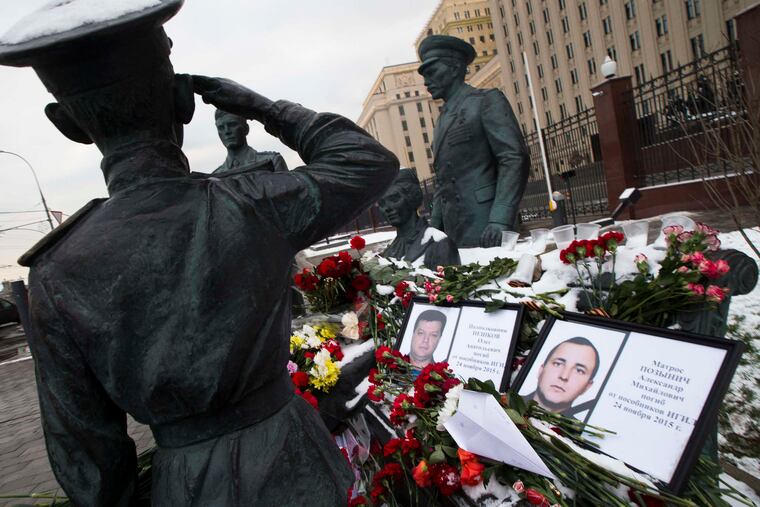Moscow ready to coordinate over Syria, Putin says
MOSCOW - Russian President Vladimir Putin said late Thursday that he was ready to coordinate strikes against the Islamic State with the United States and its allies but warned that acts such as the Turkish downing of a Russian jet could destroy any chance of collaboration.

MOSCOW - Russian President Vladimir Putin said late Thursday that he was ready to coordinate strikes against the Islamic State with the United States and its allies but warned that acts such as the Turkish downing of a Russian jet could destroy any chance of collaboration.
After talks with French President Francois Hollande at the Kremlin, Putin said: "We are ready to cooperate with the coalition which is led by the United States." It was the most forthright commitment to a joint effort between Russia and the West since Moscow's seizure of Crimea from Ukraine in 2014.
But it was far from the declaration of a new grand coalition in Syria, potentially under United Nations auspices rather than American leadership, that Putin has proposed. The deep disagreement between Russia and the West over the future of the embattled Syrian president, Bashar al-Assad, has not been put aside.
Hollande said France was ready to fight alongside Russia but added: "Of course, Assad cannot play any role in the future of this country." Since Russia intervened in Syria two months ago, Moscow and Washington have agreed on measures to "de-conflict" their aerial operations there. But as each country pounds its targets in Syria, they have not worked in tandem.
Hollande arrived in Moscow after meeting with President Obama earlier this week. The terrorist attacks in Paris on Nov. 13 have led France to step up its operations in Syria and to seek some sort of workable agreement among the foreign powers involved there. The idea has not been warmly embraced by the United States, which has accused Russia of targeting Assad's foes among the American-backed rebels, rather than the Islamic State.
Hollande said that he and Putin had agreed "to only carry out strikes against terrorists, only against ISIS, and only against jihadist groups. It is important not to strike those groups who are also fighting against terrorists," he said.
Putin has long argued that the Western powers, Russia, and China all face a common Islamist threat, and he has made it clear that he resents what he sees as relative Western indifference to attacks on Russia. He also has suggested that the United States has been negligent in taking the Islamist threat seriously enough.
The Paris attacks occurred shortly after a bomb brought down a Russian airliner on its way from Egypt's Sharm el-Sheikh resort to St. Petersburg, killing all 224 aboard. On Thursday, Putin and Hollande commiserated over the those attacks. The occasion gave Putin an opportunity to reiterate his argument about the common threat.
Putin has emphasized the fight against global terrorism as a means to repair or reestablish a meaningful partnership with the West.
"Our positions are the same," Putin told Hollande before they began their private talks. "That forces us to join our forces in fighting terrorists. We are prepared to work with you, Mr. President."
Hollande said: "I am in Moscow with you to figure out how we can act together in order to coordinate our actions to hit this terrorist group and look for political solutions for Syria."
But cooperation between Russian and Western forces operating in and over Syria faces another significant hurdle: the growing animosity between Russia and Turkey. Russian officials on Thursday promised broad sanctions against Turkey, cutting joint investment projects and banning many Turkish companies from working in Russia.
Putin said that Russia assumed there would be "no repeat" of the Turkish attack against a Russian jet this week. He implied that the United States bore some of the blame, as the military communication over air operations in Syria should have prevented any misunderstanding.
It has become clear that the Russian government is directing its ire against the Turkish economy. At a cabinet meeting, Russian Prime Minister Dmitry Medvedev said that joint investment projects with Turkey would be frozen or canceled. Negotiations over a proposed preferential trade program with Turkey would also be scrapped, he said. Medvedev called for recommendations from government agencies to be submitted within two days.
In London, British Prime Minister David Cameron on Thursday argued the case for extending Britain's airstrikes targeting the Islamic State to Syria, telling Parliament that the group posed a "fundamental threat" to the security of Britain and that the United Kingdom should not "wait until an attack takes place here." He added that British police and security services have foiled seven plots over the last year either linked to the Islamic State or inspired by its propaganda.
Cameron told Parliament that if Britain won't act "when our friend and ally France has been struck in this way, then our allies in the world can be forgiven for asking: If not now, when?"
In 2013, Cameron lost a vote on possible military intervention against Syrian regime. But the next year, Britain approved airstrikes against the Islamic State in Iraq.
On Thursday, Cameron stressed that there will only be a vote on a British air assault in Syria if it is clear that the majority of lawmakers are in favor of military action. Losing the motion, Cameron said, would be a "propaganda coup" for the Islamic State.